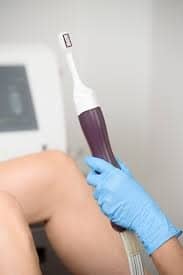How The treatment Works
Cosmetic Laser Solutions offers a non surgical, one treatment protocol with the Viveve laser treatment for SUI – Stress Urinary Incontinence.

Viveve is currently the world’s safest, all-natural treatment for urinary incontinence and vaginal dryness. With multiple clinical studies and more than 20 years of experience changing lives, Viveve is providing women around the world the solution they’ve been looking for.
The Viveve RF technology works to stimulate the muscles of the pelvic floor, strengthening and rehabilitating those muscles to restore sensation and function.
Dance, laugh, and love without worry- and its pain free!
What is Stress Urinary Incontinence?
For those not as familiar with urinary incontinence, it is a condition characterized by a n accidental oss of bladder control. Women who struggle with urinary incontinence tend to experience varying degrees of urine loss when coughing, sneezing, or even laughing. The amount of urine loss due to urinary incontinence can be either minimal or a full-on inability to avoid urinating while engaging in these activities and others. In many cases, the condition is a by product of aging. Studies show that over 44 percent of adult women over the age of 65 admit to struggling with urinary incontinence at one time or another. However, it can also stem from underlying health problems, including urinary tract infections.
Why is Urinary Incontinence More Common Among Women than Men?
Something to note when it comes to urinary incontinence is that it is considerably more common among women than men. And there are several reasons why that is the case. Along with aging, there are health issues that specifically impact women and put them at high risk of struggling with urinary incontinence, some of which include the following:
- Pregnancy
- Childbirth
- Menopause
- Hysterectomy
Women are also more likely to develop urinary infections than men, which, coincidentally, also increases their chances of having to contend with urinary incontinence. To that point, a study published by the National Institutes of Health, the world’s largest biomedical research agency, 50 to 60 percent of women in America will likely experience one or more urinary tract infections (UTIs) in their lifetime. Based on these findings, it is reasonably safe to assume that the same percentage of women will also find themselves struggling with urinary incontinence.
Additional Factors That Put Women at Risk of Experiencing Urinary Incontinence
Along with aging, pregnancy, childbirth, and underlying health problems, certain lifestyle choices can also put a woman at risk of suffering from urinary incontinence, such as smoking and not maintaining a healthy weight. The following can also lead to temporary urinary incontinence even among young women who do not have an underlying health problem:
- Consuming too much vitamin C
- Consuming too many carbonated beverages
- Excessive alcohol consumption
- Artificial sweeteners
- Heart and blood pressure medications
Studies show that these drinks, vitamins, artificial sweeteners, and medications over-stimulate the bladder and lead to an increase in urine, which sets the stage for urinary incontinence. On a side note, diabetes and neurological diseases, like dementia and Parkinson’s disease, can increase a woman’s chances of suffering from this condition as well, especially when coupled with poor lifestyle choices.
How Can Women Prevent Urinary Incontinence?
Regardless of age and other extenuating factors, there are things that women can do to minimize the effects of urinary incontinence or even prevent it from happening in the first place. Some of these things include
- Consuming less alcoholic and carbonated beverages
- Avoiding or limiting caffeine consumption
- Avoiding or cutting back on artificial sweeteners
- Consuming more fiber-rich foods
- Performing pelvic floor exercises
- Not smoking
How to fix stress incontinence
In summary, stress urinary incontinence is an unfortunate part of womanhood for many women, especially those over the age of 60. Luckily, we have a solution that addresses this issue.
This treatment is designed to address women who are experiencing urinary incontinence – leaking urine when laughing, coughing, sneezing, or jumping; sexual dysfunction and vaginal laxity – the stretching and expansion of vaginal tissue after childbirth, with age or due to hormonal changes. Studies have shown sustained results to 12 months.
The VIVEVE SYSTEM, is a patented, cryogen-cooled radiofrequency device that rebuilds natural collagen to improve the structural integrity of the vagina and to support the urethra.
The Viveve Treatment works via a small probe which emits cryogen-cooling to protect the tissue and radiofrequency waves to heat the tissue which prompts new collagen and re-invigorates the tissue to tighten.
If you’re in the Boston area, contact us for a consultation at one of our 3 locations for more information on the Viveve laser treatment for stress urinary incontinence.
For vaginal tightening or dryness learn more information on Viveve for Vaginal Rejuvenation.
Frequently Asked Questions
Pregnancy, childbirth, and menopause may contribute to urinary incontinence in women. Weak bladder muscles, overactive bladder muscles, and nerve damage may also cause urinary incontinence.
There are different types of urinary incontinence in women, including stress incontinence, urge incontinence, overactive bladder, functional incontinence,
